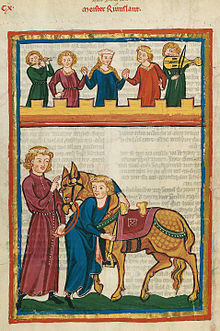Meister Rumelant
- View a machine-translated version of the German article.
- Machine translation, like DeepL or Google Translate, is a useful starting point for translations, but translators must revise errors as necessary and confirm that the translation is accurate, rather than simply copy-pasting machine-translated text into the English Wikipedia.
- Do not translate text that appears unreliable or low-quality. If possible, verify the text with references provided in the foreign-language article.
- You must provide copyright attribution in the edit summary accompanying your translation by providing an interlanguage link to the source of your translation. A model attribution edit summary is
Content in this edit is translated from the existing German Wikipedia article at [[:de:Rumelant von Sachsen]]; see its history for attribution. - You may also add the template
{{Translated|de|Rumelant von Sachsen}}to the talk page. - For more guidance, see Wikipedia:Translation.

Meister Rumelant or Rumslant (fl. c. 1273—after 1286 or 1287) was a Middle High German lyric poet. His origin is uncertain, although in his poems he referred to himself as a "Saxon". His name ("quit the land") suggests the life of a touring minstrel.
He was the first to mention the 12 'tones' (standard melodies) of the Meistersinger. His Daz Gedeones wollenvluis is a Minnelied on the subject of the mystic love (Minne) of God for the Virgin Mary. He is also known to have composed songs about the death by murder of the king Erik V of Denmark, also called Glipping, and for praising the new king Eric VI of Denmark; another famous song is Got In Vier Elementen Sich Erscheynet. Very little is known about his life, he himself being mentioned in a few pages of the 14th century Codex Manesse (414r-415r, where he is indicated as Meister Rumslant) and of the Jenaer Liederbuch.
References
- Alfred Willi Hans Hartmann, Edmund Barczyk. "Jenaer Liederbuch", 1964. ASIN B0000BJ3PI.












